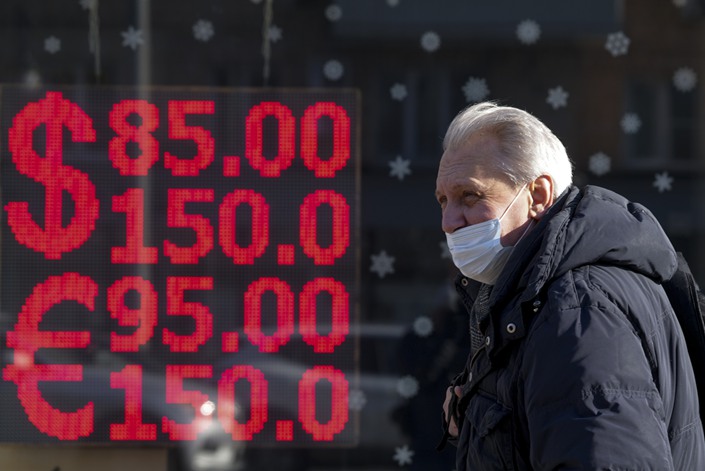
As shots were fired in Ukraine, the West followed through with an unprecedented level of economic sanctions imposed on Russia. It will be hard to assess how long the war and the corresponding sanctions will last. From investors’ point of view, we can only make an assumption that both the war and the sanctions could last for years.
The direct impact of the Russia-Ukraine war on Asia and China should not be too heavy. Official data showed that trade between China and Russia in 2021 accounted for only 2.4% of China’s total foreign trade by value, while the trade between China and Ukraine was 0.3%. Both figures were far lower than the levels of China’s trade with the EU, the U.S. and some major Asian economies. Since the war is not on Russian soil, the country’s natural gas supply to China will not be severely affected.
If the war drags on, the indirect impact on China will likely be mainly reflected in rising prices and global supply chain instability, which will affect the supply of more products. Although China’s factory-gate inflation is high, its consumer inflation is fairly mild and will remain at a low level in the first half of 2022, unless the economic situation changes drastically.
Read more Caixin’s coverage of the war in Ukraine
The war and sanctions could have a big impact on China’s financial markets. First, higher global energy prices are likely to speed up the U.S. Federal Reserve’s rate hikes. Second, we need to pay attention to the possible short-term and long-term impact of Western sanctions on Russia’s financial system. Currently, the sanctions against the Russian financial system are mainly in two aspects: One is to crack down on Russia’s major commercial banks, and the other is to freeze the overseas assets of the Russian central bank.
Sanctions against Russia’s major commercial banks not only target their overseas operations, but also make it harder for Russian companies to use global payment systems to conduct transactions. These sanctions may pose some risk to the global financial system, as all participants in the payment system are interdependent — payment problems in one link may lead to problems in other links, resulting in the failure of the whole system. Due to the complexity of the payment system and the large number of participants involved, it may be difficult to detect a minor problem before it leads to a chain reaction. Thus, it is necessary to keep a close eye on fluctuations in the currency and short-term bond markets in the coming months.
Some commentators believe that the expulsion of some Russian banks from SWIFT will allow Russian companies to increase the proportion of yuan-denominated transactions and give China’s Cross-Border Interbank Payment System (CIPS) more room for development. While this is true, Russia’s increase in yuan-denominated transactions won’t change the fact that the U.S. dollar remains the main trading currency in the world, especially given that Russia’s GDP is only about $1.5 trillion, similar to that of South China’s Guangdong province.
The main goal of the West’s move to freeze Russia’s foreign exchange reserves abroad is to limit the ability of the central bank to stabilize domestic financial markets, and to shake Russians confidence in their domestic financial system. On Feb. 28, the Russian central bank raised a key interest rate from 9.5% to 20%, but the ruble was still under immense depreciation pressure. Currently, the Russian government’s $130 billion worth of gold reserves are its most liquid assets. Its potential effective buyer may only be the People’s Bank of China (PBOC). Gold accounts for a small proportion of the PBOC’s current forex reserves, the vast majority of which are overseas bonds and deposits. As of the end of February, China had more than $3.2 trillion in forex reserves, including only more than $110 billion worth of gold. Therefore, from a pure asset allocation and risk diversification perspective, the PBOC may want to do the deal, but the main consideration for the deal would be politics.
After this round of Western sanctions on Russia, the question to ask is how other economies will consider their own financial security. After the Asian financial crisis in 1997, Asian economies have actively increased their foreign exchange reserves to ensure financial security. But Russia’s crisis shows that even economies with large foreign exchange reserves can suddenly run out of money in times of crisis — then how should those economies, including China, respond?
In the most extreme case, the world’s major economies would be divided into two camps, with central banks in each camp storing their foreign exchange reserves only in their respective camps. If this happened, the convertibility of currencies in different camps would be put into question, and the world’s financial and monetary systems would basically fall back to what it was before the 1980s.
Finally, the freezing of overseas assets of wealthy Russian tycoons is controversial as they are after all private individuals and not belligerent government organizations. This may have an impact on some international wealth management centers and global private banks. At present, Europe and the U.S. are more active in enforcing sanctions in this regard. International wealth management centers in Asia, such as Singapore and Hong Kong, want to stay out of it. But given the U.S.’ long-arm jurisdiction in the financial sector, how long can they last?
Vincent Chan is a China strategist at investment advisory firm Aletheia Capital.
The article has been edited for length and clarity.
Contact reporter Tang Ziyi (ziyitang@caixin.com) and editor Bertrand Teo (bertrandteo@caixin.com)
Get our weekly free Must-Read newsletter.







